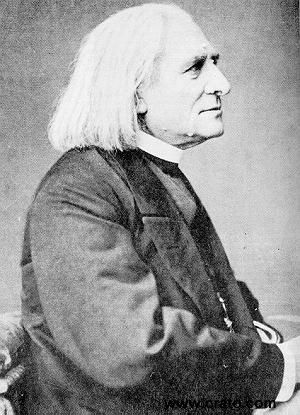 He
was also renowned as a mercurial personality and bandit of love; in short,
like the flamboyant violinist Niccolo Paganini, Liszt lived the Romantic
ideal to the hilt.
He
was also renowned as a mercurial personality and bandit of love; in short,
like the flamboyant violinist Niccolo Paganini, Liszt lived the Romantic
ideal to the hilt.
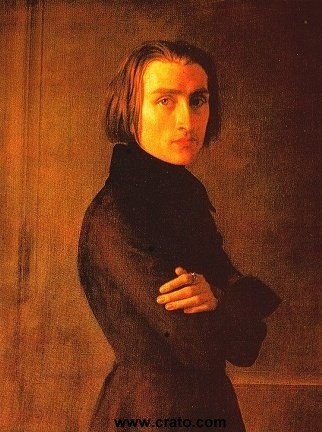 Franz Liszt,
(1811-1886)
Franz Liszt,
(1811-1886)
By Dihelson
Mendonca
C
onsidered by many
as the greatest pianist of all time, Liszt represents the romantic expression
by himself. His style of life, his many lovers, his friendships...
he was one of the first proponents of the orchestral tone poem, was an
unparalleled keyboard virtuoso and a supremely talented and innovative
composer.  He
was also renowned as a mercurial personality and bandit of love; in short,
like the flamboyant violinist Niccolo Paganini, Liszt lived the Romantic
ideal to the hilt.
He
was also renowned as a mercurial personality and bandit of love; in short,
like the flamboyant violinist Niccolo Paganini, Liszt lived the Romantic
ideal to the hilt.
Ferenc Liszt was born in Raiding,
Hungary in 1811, and began to study the piano at the age of six. He exhibited
unusual talent on the instrument, and gave a number of successful concerts
while still a child. After continuing his piano studies with the help of
Hungarian nobility, he moved with his family to Vienna, where he studied
with Carl Czerny and the now-infamous Antonio Salieri. He made more concert
appearances, and audiences took to his passionate and technically immaculate
playing. Next was Paris, where, at the age of 16, he decided to take up
long-term residence. In Paris, he met the greatest exponents of romantic
period as Frederic Chopin, Berlioz, Mendelsonn, and many poets and writers.
Liszt's house was always the place for reunions of some of the greatest
intellectuals of the 19th century. Painters like Delacroix, writers like
Victor Hugo were frequently with him. Paris, was in 19th century, considered
the "center of the world". Intelectual and artistic. A kind of New York
of that days... Europe, as a whole, was passing for profound social, economic
and politics changes, and Liszt , as many other artists of his time, took
an active position in these movements. A sincere friend,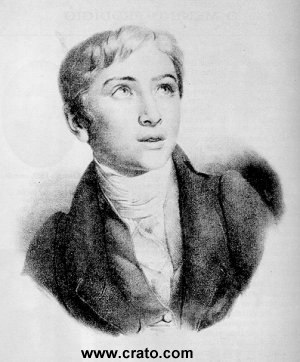 Liszt knew as a few, to help other musicians in difficulties. He often
played the music of his contemporary, and was one of the greatest Beethoven's
music enthusiasts. Indeed, Liszt was one of responsible for the construction
of the Beethoven's monument, by raising funds, playing throughout europe.
Liszt was a deep admirer of Chopin's music and his piano abilities.( Chopin
once said that he would like to have that Liszt ability to play his own
studies ). Liszt knew to express himself as few persons, and often wrote
articles for the "Gazette Muzicale de Paris" .He also wrote a Chopin's
Biography called "Chopin's Life".
Liszt knew as a few, to help other musicians in difficulties. He often
played the music of his contemporary, and was one of the greatest Beethoven's
music enthusiasts. Indeed, Liszt was one of responsible for the construction
of the Beethoven's monument, by raising funds, playing throughout europe.
Liszt was a deep admirer of Chopin's music and his piano abilities.( Chopin
once said that he would like to have that Liszt ability to play his own
studies ). Liszt knew to express himself as few persons, and often wrote
articles for the "Gazette Muzicale de Paris" .He also wrote a Chopin's
Biography called "Chopin's Life".
Liszt's fame as a piano virtuoso
grew early; in 1831 he was lucky enough to see the violinist Paganini in
performance, and that experience (Paganini's gifts on the violin were so
breathtaking that many people believed he was in league with the devil)
made a profound impact on the young pianist; he resolved to apply Paganini's
showmanship and pyrotechnics to the piano, and in so doing revolutionized
the piano as a virtuosic instrument.But later he himself got even more
directed to bring this virtuosism to more pure musical expression. Chopin
himself didn't like early Liszt's compositions, because Liszt was mainly
a virtuosistic player. But Chopin didn't live sufficient to hear Liszt's
great last works... Liszt's life reads a bit like a chapter out of Don
Juan.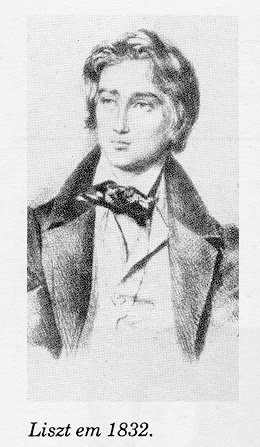 Flamboyant
in dress and manner, he carried out innumerable minor love affairs and
two major ones - first with the Countess Marie d'Agoult, and later
with the Princess Carolyne von Sayn-Wittgenstein, who worked with him while
he was Court Music Director at Weimar. At the age of 48, after living the
high life for three decades, he suddenly entered the priesthood, thereafter
splitting his musical activities between Rome, Weimar and Budapest; he
was conferred the religious title of Abbé in 1866 by Pope Pius IX.
Wherever he went, even in later years, he was surrounded by throngs of
admirers, imitators and hangers-on. One might think that all of this adulation
and personality-worship would color Liszt's approach to the music that
had vaulted him to such overwhelming fame. But this never happened; rather,
Liszt always adhered strictly to his core musical values, and considered
the directions of the composer the ultimate authority in interpretation.
He revered composers from Beethoven to Berlioz to Wagner, and always tried
to expand upon their work to create new musical forms. And he succeeded...his
transcriptions of orchestral works for the piano (Schumann's Widmung,
Verdi's Rigoletto and Aida, Beethoven's symphonies and Berlioz' Symphonie
Fantastique are only a few) led to a completely new style of piano composition,
and his orchestral tone poems, written mostly during his stint at Weimar,
are revolutionary in their use of harmonic progression and programmatic
elements.
Flamboyant
in dress and manner, he carried out innumerable minor love affairs and
two major ones - first with the Countess Marie d'Agoult, and later
with the Princess Carolyne von Sayn-Wittgenstein, who worked with him while
he was Court Music Director at Weimar. At the age of 48, after living the
high life for three decades, he suddenly entered the priesthood, thereafter
splitting his musical activities between Rome, Weimar and Budapest; he
was conferred the religious title of Abbé in 1866 by Pope Pius IX.
Wherever he went, even in later years, he was surrounded by throngs of
admirers, imitators and hangers-on. One might think that all of this adulation
and personality-worship would color Liszt's approach to the music that
had vaulted him to such overwhelming fame. But this never happened; rather,
Liszt always adhered strictly to his core musical values, and considered
the directions of the composer the ultimate authority in interpretation.
He revered composers from Beethoven to Berlioz to Wagner, and always tried
to expand upon their work to create new musical forms. And he succeeded...his
transcriptions of orchestral works for the piano (Schumann's Widmung,
Verdi's Rigoletto and Aida, Beethoven's symphonies and Berlioz' Symphonie
Fantastique are only a few) led to a completely new style of piano composition,
and his orchestral tone poems, written mostly during his stint at Weimar,
are revolutionary in their use of harmonic progression and programmatic
elements.
Liszt is perhaps best-known,
however, for his piano music, and much of it is utterly magnificent. His
monumental one-movement Sonata in B minor (1853) is one of the masterpieces
of instrumental solo music, and his numerous tone poems, showpieces and
smaller works for piano are brilliant examples of a restless, Romantic
imagination, informed but quite removed from the rigor of Classical forms.
One of his best known works are the Hungarian Rhapsodies, Annes de Pelegrinations,
( a suite) ,His Piano Concert in Eb, three Liebstraums, Valses oubliees,
Mephisto Waltzes, and his famous orchestral work, Les Preludes. Liszt's
work is vast, and his compositions are often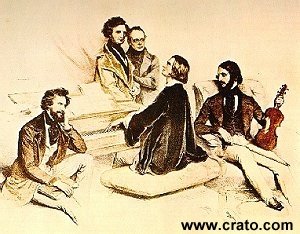 very difficult to play. He wrote his Etudes de execution Transcendental
hoping to developing new horizonts for the piano.And he knew as no other
person how to make this. Liszt 's friendship with Richard Wagner, was a
great page in his life. He admired Wagner's music, and once said that "Richard
Wagner was the greatest composer of the 19th century and perhaps of all
centuries! ". Liszt died at the age of 75, one of the longest life in terms
of classical composers, His last words while he was dying was: "Tristao"
, referring to the music of Wagner, "Tristao and Isolde".
very difficult to play. He wrote his Etudes de execution Transcendental
hoping to developing new horizonts for the piano.And he knew as no other
person how to make this. Liszt 's friendship with Richard Wagner, was a
great page in his life. He admired Wagner's music, and once said that "Richard
Wagner was the greatest composer of the 19th century and perhaps of all
centuries! ". Liszt died at the age of 75, one of the longest life in terms
of classical composers, His last words while he was dying was: "Tristao"
, referring to the music of Wagner, "Tristao and Isolde".